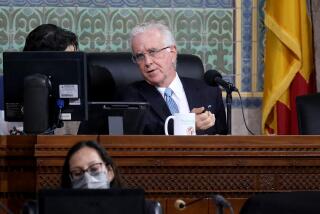Restructuring of Security Council Proposed
UNITED NATIONS — The president of the U.N. General Assembly on Thursday proposed a major restructuring of the Security Council, sounding the opening bell in what is expected to be a protracted struggle over expanding membership in the world organization’s most powerful body.
Razali Ismail, U.N. ambassador from Malaysia, wants to begin the process of expanding Security Council membership before his one-year term as General Assembly president ends in September. His plan would enlarge the Security Council from 15 to 24 members and increase the number of its permanent members from five to 10.
The expansion presumably would include Germany and Japan as permanent members but also would give greater representation to developing nations.
Changes in the Security Council require approval of two-thirds of the 185-member General Assembly. Razali’s proposal is expected to serve simply as the framework for negotiations that could extend into next year.
The Security Council is the U.N. agency that dispatches peacekeeping forces, selects the secretary-general and takes the lead in seeking to resolve international tensions. Although it was expanded from 11 to 15 members 32 years ago, it has remained essentially unchanged in character since the founding of the United Nations in 1945. The five nations designated as permanent members--the United States, Russia, Britain, France and China--represent the victorious allies in World War II, and each can wield veto power over any council action.
The 10 other seats on the council are rotated among the rest of the U.N. membership in two-year terms, and none has veto power.
There is fairly wide support in the United Nations for giving Germany and Japan permanent seats on the council--although without veto power. Beyond that the issue bogs down in the regional politics and international enmities that crosshatch most U.N. debates. Developing nations insist on tying German and Japanese admission to expanded representation for them but cannot agree on who should be included on the select list.
India would seem a logical Asian representative, for example, but would be opposed by rival Pakistan and other Muslim nations.
Razali sought to meet many objections with a proposal to allocate two permanent seats to “industrialized nations”--presumably Japan and Germany--and one each to developing states in Africa, Asia and the Latin American and Caribbean region. Four new nonpermanent seats would be reserved for nations in Africa, Asia, Eastern Europe and Latin America, with each elected by member countries in their region. No new member would be able to veto council actions.
The United States favors admission of Germany and Japan, but wants to limit expansion of the Security Council to a total of 20 or 21 members.
Italian Ambassador Francesco Paolo Fulci argues that expansion of the council relegates to second-class status mid-level economic powers such as Italy. Fulci, however, has not lost his sense of humor about the issue. Noting the proposed elevation of Germany and Japan, Fulci wryly seeks support for Italy’s position by quipping, “We lost the war too.”
More to Read
Sign up for Essential California
The most important California stories and recommendations in your inbox every morning.
You may occasionally receive promotional content from the Los Angeles Times.










